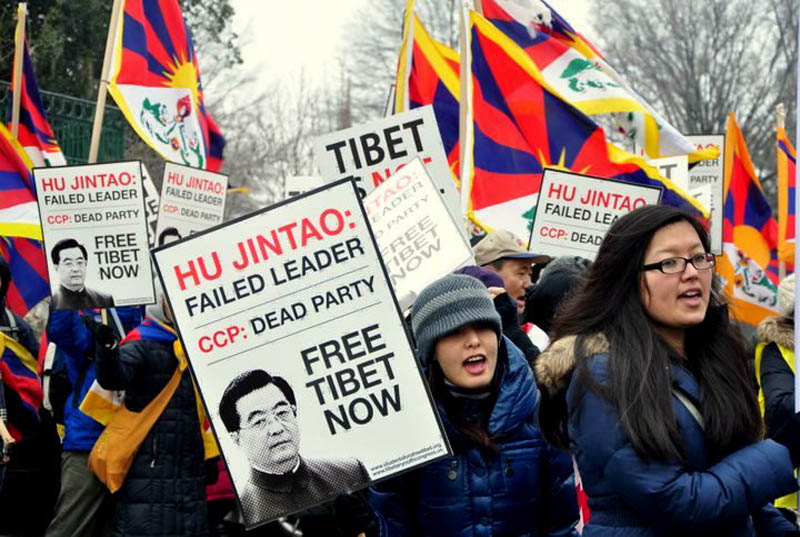 Washington: Hundreds of Chinese, Tibetans and supporters loudly demonstrated outside the White House on Tuesday as Mr Hu Jintao, the President of communist China began a state visit to the United States. An array of delicate issues will be on the table for discussion during Hu's visit. The Obama administration has vowed to express concerns over China's currency, national security stance and human rights record. "We will continue to have difficult conversations" with Hu, White House Press Secretary Robert Gibbs said Tuesday.
Washington: Hundreds of Chinese, Tibetans and supporters loudly demonstrated outside the White House on Tuesday as Mr Hu Jintao, the President of communist China began a state visit to the United States. An array of delicate issues will be on the table for discussion during Hu's visit. The Obama administration has vowed to express concerns over China's currency, national security stance and human rights record. "We will continue to have difficult conversations" with Hu, White House Press Secretary Robert Gibbs said Tuesday.
"We are here today to cry out for our human rights," Liu Tongxing, leader of the China Democracy Party, told AFP, as activists chanted slogans in Chinese. The protesters held up banners urging President Barack Obama to "admonish Hu" over human rights abuses and the conflict over Tibet when the two leaders meet at the White House.
"We came here to live because in China we were deprived of our human rights. We want China to be like the United States, where everyone can express their opinion freely," Liu said through an interpreter. "We want people to be judged by the legal system, not by someone's personal opinion," he added, as the Chinese and US flags lining Pennsylvania Avenue rippled in the chilly winter breeze.
As Tibetan activists have planned three days of protests in Washington during Hu's visit. Tibetan protesters marched up and down the pavement outside the White House under an icy rain as they brandished placards reading: "Tibet will be free" and called on Obama to raise the issue with Hu. The two leaders are due to hold talks in the Oval Office on Wednesday, the first full day of Hu's visit.
"The activities of the Chinese government, the economic exploitation in Tibet and the resulting environmental devastation of Tibet have consequences beyond Tibet's borders," Tenzin Dorjee, executive director of Students for a Free Tibet, told AFP. He accused China of damming rivers in Tibet that irrigate much of Asia, stripping the region of its mineral riches and killing off the nomadic and religious way of life on the remote plateau.
"It is the responsibility of the entire world, and particularly the US government under the leadership of President Obama, to speak directly to the leadership responsible for these actions, to ask President Hu Jintao to speedily negotiate a resolution to this issue," Dorjee said.
Standing across the road in Lafayette Square, where icicles hung from the statues of heroes of the 18th-century US revolutionary war, Sonam Wangdu handed out leaflets calling Hu a "failed leader."
"There's no question the White House hears us," he said as the protesters used megaphones and wireless microphones to amplify their chants. "But they don't take action, because economically the US is under China. They can't do anything," he said.
US-based Human Rights Watch (HRW) last week released a scathing assessment of China's human rights record and dismissed a plan presented by Beijing two years ago to address such issues. The Chinese government still "tramples on many of the most basic rights," HRW's Asia advocacy director Sophie Richardson said, urging Obama and US Secretary of State Hillary Clinton to raise the thorny issue with Hu.
She slammed a 2009 statement by Clinton that rights concerns would not "interfere" with US-China cooperation. Clinton said last week that human rights were at "the heart" of US diplomacy, and stressed that China, a founding member of the United Nations, "has committed to respecting the rights of all its citizens."
Gibbs on Wednesday, also said that US officials would forcefully address the issue of human rights during talks with Hu. He added that they would discuss the plight of Obama's successor as Nobel peace laureate Liu Xiaobo, who is serving an 11-year jail term for co-authoring a petition on political reform.


![Tibet has a rich history as a sovereign nation until the 1950s when it was invaded by China. [Photo: File]](/images/stories/Pics-2024/March/Tibet-Nation-1940s.jpg#joomlaImage://local-images/stories/Pics-2024/March/Tibet-Nation-1940s.jpg?width=1489&height=878)















